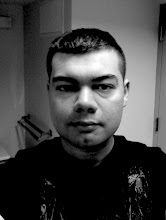Not long ago I was having a conversation on the topic of "truth" in which I admitted that I thought that virtually anything I perceived to be true could, in fact, be incorrect. The person I was conversing with thus concluded that I had
"given up on truth" and while I tried to press further into what the person meant by that exactly, it seemed that was their sign to give up talking to me so, I unfortunetly didn't get to explore that statement much.
From my perspective at least, my spiritual journey has always been about my hunger for what is true and aligning myself with that to the best of my ability. At the same time, my idea of what is true has obviously changed over the years and it seems the more fervently I try and nail down and define it, the more elusive it seems to be. In one of his books, Alan Watts uses the analogy of
"trying to get the water of life into neat and permanent packages," which quite accurately describes my past attempts at trying to discover what the absolute truth of reality is.
So, in a sense, I'd say that person was actually correct in saying that I had given up on truth. I have given up on it in the sense of having the certainty that my beliefs about God and the universe are unquestionably true. That idea of truth is what seems to have gotten humanity in a lot of trouble throughout history and I find it to be incredibly unrealistic. One of the things I like to bring up is that various people of various faith traditions throughout history have all claimed exclusive rights to this idea of truth. Debates, stake burnings, wars and rumors of wars have all been had over people's certainty that they understood truth and that anyone who claimed different was wrong, if not plain evil and deceptive. So, whenever you claim to have the truth you inevitably
have to do something with all the other truth claims that have been made especially those that seem to yield miraculous and/or positive results in people's lives. I find the more I come to understand about many of those who hold those differing claims, the less I judge them or their beliefs.
Various experiences and findings are used as evidence in supporting such claims on truth but they are nonetheless very subjective and never settle the issue for everybody. What I'm wondering though is what does a sensible person, who is genuinely interested in the truth, to make of all these claims and the various things used in support of them? How often do people actually investigate these differing claims and their support
without some sort of dismissive, apologetic agenda that has made up their minds well before hand?
Why is it that when someone is convinced they have discovered spiritual truth and yet someone else shows their disagreement, it is so often assumed that the other party is merely refusing to see it? It's as if our perceptions of truth are like interestingly-shaped rocks that a person discovers and then proclaims to everyone how it's the greatest treasure. Some come to agree but they are always surprised when someone else
doesn't see it as anything that great and insists that it is just simply a rock. The treasure-finder then assumes the person is refusing to see it or has not been "gifted" to do so, and thus react accordingly...either by trying harder to make them believe, dismissing them as fools or by having their head chopped off (which is still a modern reality in some places).
I'm thinking the above vision of truth does not work though and there may be a more sensible perspective. For me, truth is about embarking upon a personal journey where I experiment with different ideas and practices and discover what seems to work and what doesn't. To ask,
"what is truth" is of little benefit if one is expecting a black and white, neat and packaged answer. The reason I say that is if there is such a thing as absolute truth regarding God and spirituality, it seems that it transcends anything we can say or think about it. Linguistics and symbology will faith the absolute truth every time. Understandably, that seems to be a frustrating idea to a lot of people but it need not be if they can learn to set aside their presumptions and soak in the mystery that is truth. The journey is best when we can find those interesting
"rocks" and appreciate them aesthetically without bashing them over the head's of others in hope's they'll
get it. I think we can celebrate our ideas and personal truth's without insisting they are the absolute truth and be open to better ideas coming our way to shape our understanding of truth over the course of our lives.

No comments:
Post a Comment